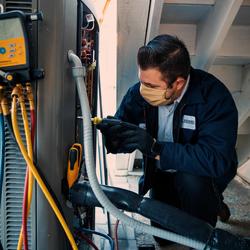Do Heat Pumps Work in California?
Yes, heat pumps work very well in California. In fact, California’s moderate climate is the perfect environment for heat pumps.
On top of that, the state of California prioritizes heat pumps over other HVAC systems, such as furnaces, because they generate far lower carbon emissions.
In this blog, we’ll explain:
Interested in a free heat pump installation estimate?
Just reach out to the pros at True Home. We’re committed to helping you make educated decisions that benefit your home and budget. When you schedule with us, we’ll send over one of our licensed technicians to go over your heat pump options, without selling you upgrades you don’t need.
Why heat pumps are perfect for California’s climate
To answer this question it’s first helpful to understand how heat pumps work.
Heat pumps work by absorbing heat from one space and transferring it to another. This method allows the heat pump to both:
- Cool a home in the summer—by absorbing heat from inside your home and transferring it outdoors
- Heat a home in the winter—by absorbing heat from the outdoors and transferring it indoors
A heat pump’s unique heat-transfer method is perfectly suited for most California climates. That’s because California has moderate winters, which means there’s typically enough heat in the outdoor air for your heat pump to absorb and transfer indoors to keep your home warm.
On the other hand, heat pumps often struggle in colder climates, where winter temperatures drop below 35° F. Below this point, the outdoor air provides very little heat for a heat pump to absorb and then transfer inside to keep your home warm.
Unfortunately, when there’s very little heat in the outdoor air to warm your home, a heat pump will usually switch over to either a more expensive type of “back-up” heat (electric resistance heat strips) or a heat source that produces higher carbon emissions (gas furnace). The type of back-up heat a heat pump switches to in cold weather all depends on the type of system installed.
Regardless of the type of back-up heat used, nothing is as cost-effective or as efficient as a heat pump’s “heat transfer” method, which is why California’s mild winters is the perfect environment for a heat pump.
Why heat pumps are more energy-efficient than other systems
Like we mentioned above, heat pumps operate by transferring heat from one space to another. And in winter, this process makes a heat pump much more energy-efficient than other systems.
Because they simply move heat and do not create heat, heat pumps require less energy to warm your home. In fact, according to energy.gov, a heat pump uses up to 50% less energy than other electric resistance heaters that operate by creating heat, such as electric furnaces or baseboards.
Refrigerant is the secret weapon that helps heat pumps transfer heat using very little electricity. It is a special chemical that is designed to absorb heat like a sponge absorbs water. Refrigerant travels in a closed loop through the heat pump system absorbing heat from one area (either from indoors or outdoors) and dumping it into another.
Refrigerant does not need electrical energy to perform its primary function—absorbing heat from air. This makes a heat pump much more energy-efficient than electric resistance heating systems.
What California’s push for “electrification” means for heat pumps
With California continually pushing for the “electrification” (the process of replacing technologies that use fossil fuels with those that use electricity) of new homes and buildings, heat pumps are becoming more and more popular.
While homeowners with existing gas heating systems (and other gas appliances) won’t need to replace their gas furnace preemptively, we’d suggest that you consider a heat pump if you are building a new home.
A lot of cities in California are pushing “gas-bans” on all new construction homes and buildings. That said, depending on where you live, it might be smarter and more cost-effective to install a heat pump vs a gas furnace.
Of course, the system that is best for you all depends on whether your home is a new build, where you live and a few other factors.
Have more heat pump questions?
Not sure what heating or cooling system is best for you? There are a lot of factors to consider but don’t worry, we can help. At True Home, we understand California’s climate and local codes and requirements better than anyone. We can help you make the right choice for your HVAC system installation.
We offer free installation estimates. We also offer greater warranty protection, with Orange County's longest and most comprehensive install labor warranty (10 years of protection included for most systems).
